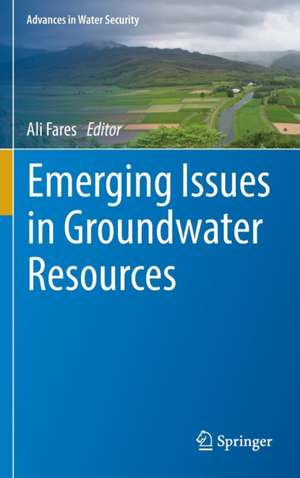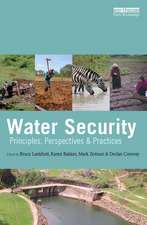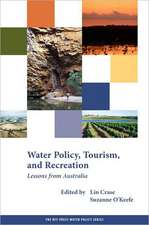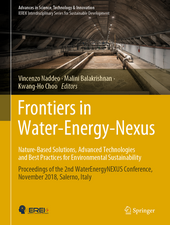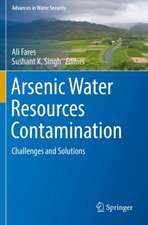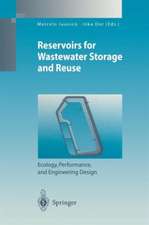Emerging Issues in Groundwater Resources: Advances in Water Security
Editat de Ali Faresen Limba Engleză Hardback – 19 aug 2016
This book discusses how emerging groundwater risks under current and potential climate change conductions reduce available groundwater resources for domestic use, and agriculture and energy production. The topics discussed throughout this book are grouped into five sections; (i) Sea Level Rise, Climate Change, and Food Security, (ii) Emerging Contaminants, (iii) Technologies and Decision Support Systems, (iv) Surface Water-Groundwater Interactions, and (v) Economics, and Energy Production and Development.
This book is unique and different from other groundwater hydrology books in that it uses a holistic approach in investigating the risks related to groundwater resources. This book will be of interest to a wide audience in academia, governmental and non-governmental organizations, and environmental entities. This book will greatly contribute to a better understanding of the emerging risks to groundwater resources and should help responsible stakeholders make informed decisions in this regard.
This book is unique and different from other groundwater hydrology books in that it uses a holistic approach in investigating the risks related to groundwater resources. This book will be of interest to a wide audience in academia, governmental and non-governmental organizations, and environmental entities. This book will greatly contribute to a better understanding of the emerging risks to groundwater resources and should help responsible stakeholders make informed decisions in this regard.
| Toate formatele și edițiile | Preț | Express |
|---|---|---|
| Paperback (1) | 857.52 lei 6-8 săpt. | |
| Springer International Publishing – 22 apr 2018 | 857.52 lei 6-8 săpt. | |
| Hardback (1) | 900.40 lei 6-8 săpt. | |
| Springer International Publishing – 19 aug 2016 | 900.40 lei 6-8 săpt. |
Preț: 900.40 lei
Preț vechi: 1059.29 lei
-15% Nou
Puncte Express: 1351
Preț estimativ în valută:
172.31€ • 178.01$ • 143.41£
172.31€ • 178.01$ • 143.41£
Carte tipărită la comandă
Livrare economică 25 martie-08 aprilie
Preluare comenzi: 021 569.72.76
Specificații
ISBN-13: 9783319320069
ISBN-10: 3319320068
Pagini: 498
Ilustrații: XI, 414 p. 149 illus., 129 illus. in color.
Dimensiuni: 155 x 235 x 24 mm
Greutate: 7.63 kg
Ediția:1st ed. 2016
Editura: Springer International Publishing
Colecția Springer
Seria Advances in Water Security
Locul publicării:Cham, Switzerland
ISBN-10: 3319320068
Pagini: 498
Ilustrații: XI, 414 p. 149 illus., 129 illus. in color.
Dimensiuni: 155 x 235 x 24 mm
Greutate: 7.63 kg
Ediția:1st ed. 2016
Editura: Springer International Publishing
Colecția Springer
Seria Advances in Water Security
Locul publicării:Cham, Switzerland
Cuprins
Chapter 1 Effects of Climate Change and Sea Level Rise on Coastal Water Resources.- Chapter 2 Assessing Groundwater Pollution Risk in Response to Climate Change and Variability.- Chapter 3 Deficit Irrigation as a Strategy to Cope with Declining Groundwater Supplies: Experiences from Kansas.- Chapter 4 Hydraulic Fracturing and Its Potential Impact on Shallow Groundwater.- Chapter 5 Pharmaceuticals and Groundwater Resources.- Chapter 6 Remove Sensing Applications for Monitoring Water Resources in the UAE Using Lake Zakher as a Water Storage Gauge.- Chapter 7 Assessment of Groundwater Balance Terms Based on the Cross-Calibration of Two Different Independent Approaches.- Chapter 8 Evaluation of Submarine Groundwater Discharge as Coastal Nutrient Source and Its Rose in Coastal Groundwater Quality and Quantity.- Chapter 9 Quantifying Groundwater Export from an Urban Reservoir: A Case Study from Coastal South Carolina.- Chapter 10 Evaluating Hydrogeological and Topographic Controls on Groundwater Arsenic Contamination in the Middle-Ganga Plain in India: Towards Developing Sustainable Arsenic Mitigation Models.- Chapter 11 Groundwater and Surface Water Interactions in Relation to Natural and Anthropogenic Environmental Changes.- Chapter 12 Contemporary Methods for Quantifying Submarine Groundwater Discharge to Coastal Areas.- Chapter 13 Management of Declining Groundwater Resources and the Role of Policy Planning in Semi-Arid Economics: The Case of Texas High Plains.- Chapter 14 Groundwater Exploitation as Thermal Fluid in Very-Low Enthalpy Geothermal Plants in Coastal Aquifers.
Textul de pe ultima copertă
This book discusses how emerging groundwater risks under current and potential climate change conductions reduce available groundwater resources for domestic use, and agriculture and energy production. The topics discussed throughout this book are grouped into five sections; (i) Sea Level Rise, Climate Change, and Food Security, (ii) Emerging Contaminants, (iii) Technologies and Decision Support Systems, (iv) Surface Water-Groundwater Interactions, and (v) Economics, and Energy Production and Development.
This book is unique and different from other groundwater hydrology books in that it uses a holistic approach in investigating the risks related to groundwater resources. This book will be of interest to a wide audience in academia, governmental and non-governmental organizations, and environmental entities. This book will greatly contribute to a better understanding of the emerging risks to groundwater resources and should help responsible stakeholders make informed decisions in this regard.
This book is unique and different from other groundwater hydrology books in that it uses a holistic approach in investigating the risks related to groundwater resources. This book will be of interest to a wide audience in academia, governmental and non-governmental organizations, and environmental entities. This book will greatly contribute to a better understanding of the emerging risks to groundwater resources and should help responsible stakeholders make informed decisions in this regard.
Caracteristici
Broadens understanding of threats to groundwater resources Maximizes reader insights into the different approaches and decision support systems for quantifying groundwater resources Casts new light on environmental problems such as the groundwater contamination due to hydraulic fracturing for energy production; and wastes from pharmaceutical and wastewater treatment plants
